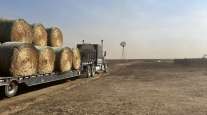Staff Reporter
ATA Calls on Texas Governor to Stop ‘Senseless Inspections’

[Stay on top of transportation news: Get TTNews in your inbox.]
The head of American Trucking Associations is calling on Texas Gov. Greg Abbott to end the truck inspection initiative he recently launched at the state’s border with Mexico, chastising the plan for the crippling effect it is having on the economy, and trucking in particular.
“Gov. Abbott is directly responsible for applying these new, senseless inspections on our industry, as well as the adverse impact they are having on the economy and hardworking Americans, including truckers,” ATA President Chris Spear said in an April 15 statement. “We ask that the governor scrap his misguided scheme immediately.”
Abbott on April 6 directed the Texas Department of Public Safety to immediately begin conducting additional safety inspections of vehicles crossing international ports of entry into the state. The effort has led to extended backups at the border, causing frustration for businesses and truck drivers.

(Omar Ornelas /The El Paso Times via Associated Press)
READ MORE
Abbott attributed the move to a need for additional inspections to prevent illegal immigration into his state, and to protect citizens from unsafe vehicles and drivers. He recently signed an agreement with three Mexican states to improve security.
Spear stressed that while ATA supports border security, the new inspection effort in Texas is “wholly flawed, redundant and adding considerable weight on an already strained supply chain.”
He noted that in 2021 nearly 3.3 million loaded trucks from Mexico entered the U.S. through Texas ports to deliver products including perishable foods and automotive manufacturing components.
“These duplicative screenings of commercial vehicles on our southern border are unleashing a negative, tangible downstream impact, hurting businesses and employees in other parts of the country who have no say and no responsibility over federal border policy,” Spear said.

Spear
“As we saw recently along the northern border, it doesn’t take long for factories to begin closing their doors after a vital commercial artery such as this one gets pinched.”
He noted that the new DPS safety inspections add layers of inspection for motor carriers already subject to federal border screenings that have a strong record of compliance. Spear stressed the new inspections are resulting in “little safety benefit, while the congestion and impact on our already stressed supply chain will cause the price of goods to rise.”
His views are shared by John Esparza, president and CEO of Texas Trucking Association, who told Transport Topics, “if you’re a motor carrier operating on the border today you are accustomed to inspections greater than you will see anywhere else in the state” with layers of inspection there from different agencies such as the U.S. Customs and Border Patrol, the Department of Transportation, etc.

Esparza
“Anybody sending trucks over the border has to put their best equipment and their best people moving that equipment because it’s got to sustain existing scrutiny that’s been going on for years,” Esparza said, adding it is “natural to see a greater compliance percentage at our borders than any other part of the state.”
He also stressed the effect the backups are having on truck drivers, who are waiting for hours at the border trying to cross without access to amenities such as food and restrooms.
“We can talk about the economic impact. What about how uncomfortable it is to be a driver in those trucks now, with an unknown amount of time — and a schedule, hours of service, federal mandated rest and driving times that you have to adhere to? It can be pretty stressful, and that’s something that gets lost in this,” Esparza said.
Want more news? Listen to today's daily briefing below or go here for more info:



